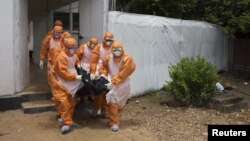The Ebola virus has grabbed global attention - and sparked panic - having killed more than 3,500 people in just several months in West Africa. But medical experts say that while Ebola needs all the attention it can get, the world also cannot lose sight of other health issues -- such as HIV, tuberculosis and malaria, which kill far more people each day.
Ebola has ravaged the nations of Liberia, Guinea and Sierra Leone, infecting thousands of people and killing more than half of those who are known to have contracted the virus. The scale has prompted the United Nations to declare an unprecedented health mission to combat the disease and the United States to commit thousands of troops to West Africa to assist in the effort.
Despite all that attention, Ebola is nowhere close to being the biggest killer on the planet, or even in Africa.
Every day, the juggernauts of infectious diseases -- AIDS, tuberculosis and malaria -- kill nearly 10,000 people, the World Health Organization (WHO) estimates.
But WHO spokesman Tarik Jasarevic says this latest Ebola explosion is still truly terrifying - because of the disease’s violent nature and its devastating impact on communities.
“The way people suffer, it’s something terrifying. The symptoms start with a fever, but then there is a lot of diarrhea, bleeding, vomiting -- it’s a very stressful situation for family members and also for health workers," said Jasarevic. "People who have not been in a treatment center may be dying outside, people know they should not be touching something, there may be cases where bodies are being left out.
"So all of that makes people very afraid of this disease and basically also the point that you should not be touching other people. There is all this fear and anxiety, it really can mark the society, it really can have a psychological impact on the community,” he said.
Fear over HIV, TB funding
Dr. Tom Ellman of medical aid group Doctors Without Borders agrees that an aggressive response to Ebola is needed. The group, which goes by its French acronym, MSF, has been a fixture on Ebola’s front lines.
“The focus on Ebola is needed at the moment. What we must ensure is that the world is able to increase its focus on other areas, like HIV and TB as well,” says he.
But Ellman, who directs the aid agency’s Southern Africa Medical Unit, says the longer Ebola persists -- and the WHO predicts this epidemic could last several years - the more he worries about the longer-standing threats.
“The big worry that we have at the moment in general is, firstly, looking at Ebola, how long it took for the world to wake up and recognize that there was a global responsibility to support the response.
"But also, how we’re seeing now a fallback in funding around HIV and TB, and are very, very concerned that over the next few years we are going to see a return to business as usual on response to infectious diseases and insufficient funding to maintain what we’ve achieved so far, which in HIV and TB over the last 10 years has been an incredible response in improving access to diagnosis, treatment and prevention,” said Ellman.
Both organizations think that more, not less, needs to be done to fight Ebola. WHO spokesman Jasarevic said they are concerned about the effect the disease is having on overall health systems in the three affected countries.
“There is less health personnel in existing facilities and many of them have to deal with Ebola, and when there are Ebola patients at one of our Ebola facilities, other people who have other medical conditions may not wish to come, for fear of not getting Ebola,” said Jasarevic.
Ebola continues to kill, with the virus recently making landfall in the United States and Spain. But medical experts in Africa want policy makers to remember that for every life Ebola takes, HIV, TB and malaria take thousands more.
